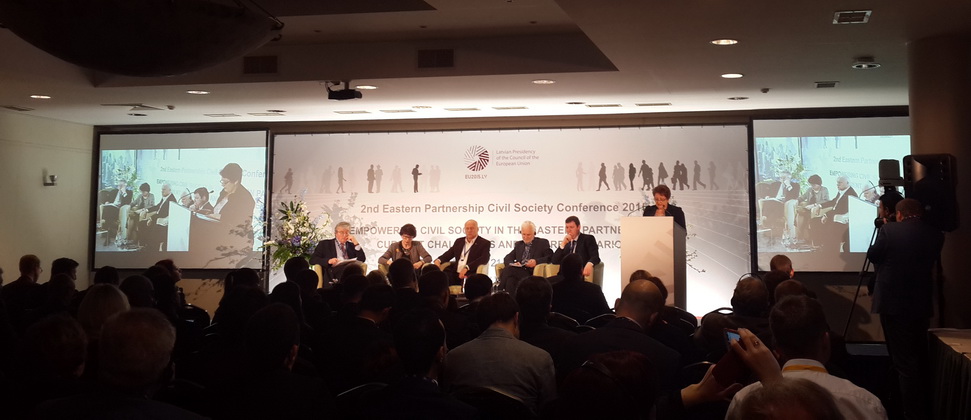The Belarusan National Platform of the EaP CSF issued a statement in connection with the wave of searches in the editorial offices of the Belarusan media and the detention of journalists.
Civil Society Conference in Riga is the message to the Eastern Partnership Summit

Eastern Partnership Civil Society Conference kicked out early in the morning on May 20 in Riga.
The meeting was dedicated to the Eastern Partnership Summit that starts today in Riga and where state representatives from the EaP countries and EU leaders will gather together.
Latvian Prime Minister Laimdota Straujuma spoke at the opening ceremony. She noted very important input of the independent civil organizations to the development of the societies in the EaP countries, at the same time stating a number of challenges that civil society of the countries-members of the EaP and the EU still have to resolve.
Eastern Partnership is going through hard times these days. Over the last 6 years from the start of the initiative simultaneously with the significant progress of a number of countries-partners towards reforms according to the European pattern the region also faced unprecedented resistance to the Europeanization processes on the part of Russia, which in number of cases is seen in frozen (as in case with Georgia) or open (as in case with Ukraine) military conflicts.
It is no surprise that the issues of Russian aggression, information war, and regional safety have become primary within the frames of the two first sections of the civil society conference in Riga.

Obviously, the development of situation in Ukraine today to a large extent defines how the EaP initiative is developing. At the same time, according to the speaker within the frames of the introductory panel discussion Ales Bialiatski, the head of the Human Rights Center “Viasna”, if 6 years ago EaP initiative started in “5+1” format, today it is rather “3+1+2” format. I.e. not only processes of open geopolitical competition have increased in the region, but also unfolding of political regimes towards autocratization and enhancement of tension at human rights defendants and representatives of independent media.
Judging by all, civil society today is unable to offer any ready-made decisions. We are rather looking for adequate answers to challenges — what should we do with political regimes that don’t demonstrate intentions towards Europeanization; how to oppose total and aggressive Russian propaganda not only in the EaP countries, but also in the EU.
The main message of the civil society to the Riga Summit is to be designed and voiced today. But even now it is clear that its main provisions are related with the issues of regional security and rights of countries for self-determination in its civilized choice.
EuroBelarus Information Service
Others
-
Statement of the Belarusan EaP CSF National Platform on solidarity with the civil society of Armenia
The Belarusan National Platform of the Eastern Partnership Civil Society Forum issued a statement on solidarity with the civil society of Armenia.
-
Statement of the BNP in connection with the criminal prosecution of the leaders of the Belarusan independent trade unions
The Belarusan National Platform of the Eastern Partnership Civil Society Forum issued a statement in connection with the criminal prosecution of the leaders of the Belarusan independent trade unions.
-
Final event of project CHOICE — Paving the way to European Year of Cultural Heritage 2018
The final event of the two-year EU funded project CHOICE — Cultural Heritage: Opportunity for Improving Civic Engagement was held on June 6, 2017 at the Committee of the Regions, in Brussels.
-
Heritage is a verb. The results of the CHOICE project were summarized in Minsk (Photos and video)
Does Belarus need a “Public Ministry of Culture” and “Ašmiany Charter” to deal with the historical and cultural sites?








Comments
Andrei Yahorau — Al Jazeera: “Lukashenko is irresponsible”
He said Belarus would likely face economic tightening not only as a result of the coronavirus pandemic but also a Russian trade oil crisis that worsened this past winter.